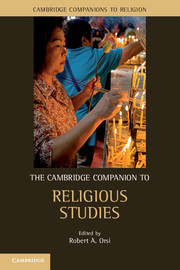Book contents
- Frontmatter
- Introduction
- Part one Religion and religious studies: the irony of inheritance
- 1 On sympathy, suspicion, and studying religion: historical reflections on a doubled inheritance
- 2 Thinking about religion, belief, and politics
- 3 Special things as building blocks of religions
- 4 The problem of the holy
- Part two Major theoretical problems
- Part three Methodological variations
- Index
1 - On sympathy, suspicion, and studying religion: historical reflections on a doubled inheritance
from Part one - Religion and religious studies: the irony of inheritance
Published online by Cambridge University Press: 28 March 2012
- Frontmatter
- Introduction
- Part one Religion and religious studies: the irony of inheritance
- 1 On sympathy, suspicion, and studying religion: historical reflections on a doubled inheritance
- 2 Thinking about religion, belief, and politics
- 3 Special things as building blocks of religions
- 4 The problem of the holy
- Part two Major theoretical problems
- Part three Methodological variations
- Index
Summary
Wilfred Cantwell Smith opened The Meaning and End of Religion, published in 1962 shortly before he took charge of Harvard's Center for the Study of World Religions, with a conspicuously slanted account of the scholarly enterprise of studying religion. Privileging experiential faith, Smith reproached “certain scholars,” unnamed, for the vanity of their empiricism and historicism, for their underlying irreverence and insensitivity. “Such scholars might uncharitably be compared to flies crawling on the outside of a goldfish bowl,” Smith concluded, “making accurate and complete observations on the fish inside, measuring their scales meticulously, and indeed contributing much to a knowledge of the subject, but never asking themselves, and never finding out, how it feels to be a goldfish.” Here instead, Smith argued, was a subject that demanded “imaginative sympathy” and “appreciative understanding,” even perhaps “something akin to awe” and “experiential participation.” Only careless hubris allowed scholars to think that religion was a “field of study” in which “a would-be surveyor” could draw its bounds and stride confidently across it: “One must tread softly here,” Smith advised, echoing a line from William Butler Yeats, “for one is treading on men's dreams.” Smith insisted that he wanted to hold onto “the hard-won heritage of scholarship and science” in the academy, alongside “the precious heritage of ultimates at the heart of the world's faith.” Still, when it came to the study of religion, he clearly wished to put the former in the service of the latter. Critical suspicion and secular scholarship did not measure up well against the higher ideals of sympathetic appreciation and spiritual cosmopolitanism.
- Type
- Chapter
- Information
- The Cambridge Companion to Religious Studies , pp. 15 - 35Publisher: Cambridge University PressPrint publication year: 2011



